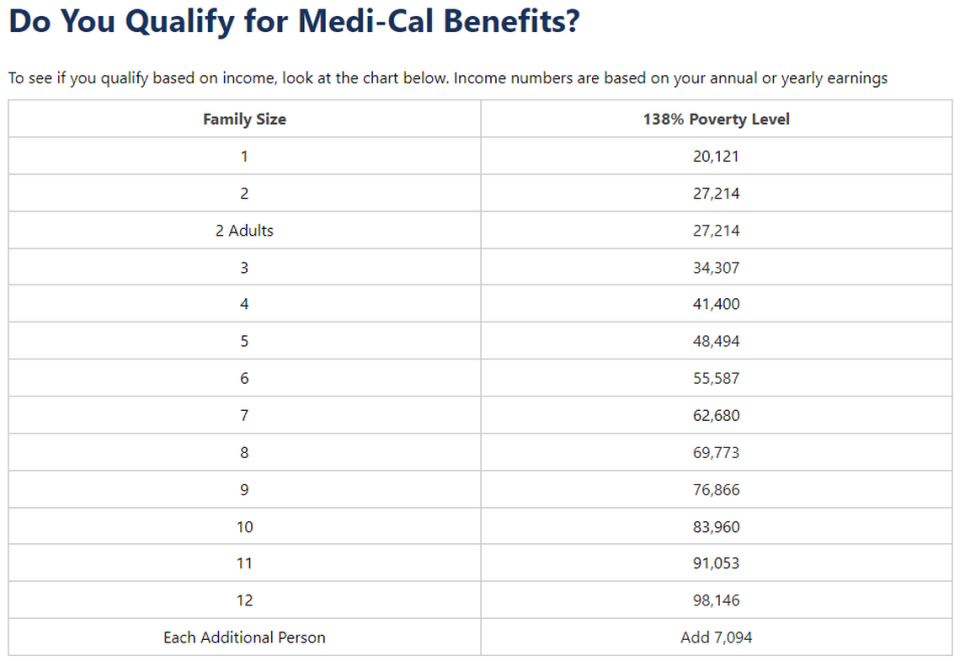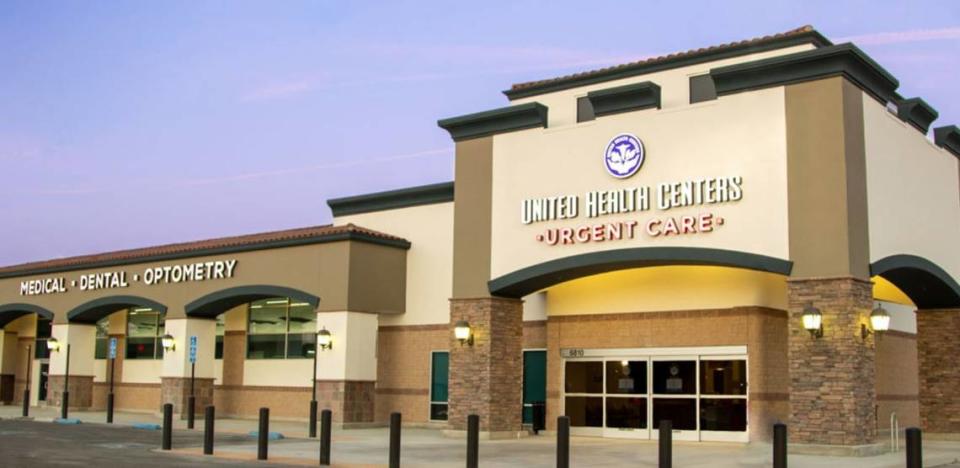California undocumented residents of all ages now eligible for Medi-Cal. How to apply?
California residents became eligible this year for Medi-Cal regardless of age and immigration status, as long as they meet the income eligibility limitations.
This latest expansion welcomed 26- to 49-year-old adults to apply for full-coverage Medi-Cal as of Jan. 1. With the change, California became the first in the nation to offer healthcare to all eligible undocumented age groups across the state.
In Fresno County, more than 547,000 people were enrolled and eligible as of January 2023, according to state data. With approximately 1.02 million residents, that means more than half the county depends on affordable healthcare.
The Fresno Bee spoke to the Department of Health Care Services (DHCS) and asked questions about the latest expansion, what full Medi-Cal coverage means, what makes someone eligible and how to apply. Here’s what they said:
What does Medi-Cal offer?
Medi-Cal provides a “core set of benefits” – like doctor visits, hospital care, immunization, pregnancy-related services and nursing home care – including ten comprehensive service categories known as the Essential Health Benefits (EHB), which are made accessible through the Affordable Care Act, per the DHCS.
These service categories include:
Outpatient (ambulatory) services
Emergency services
Hospitalization
Maternity and newborn care
Mental health and Substance Use Disorder services
Prescription drugs
Programs such as physical and occupational therapy (known as Rehabilitative & Habilitative Services) and devices
Laboratory services
Preventive and wellness services & chronic disease management
Children’s (pediatric) services, including oral and vision care
Medi-Cal can also cover dental and vision care services, and transportation to the services it covers.
What are the eligible income limits for Medi-Cal?
As of 2023, the DHCS listed the following as income limits per person or family to be eligible for Medi-Cal:

Who is eligible for Medi-Cal in 2024?
Adults ages 26 through 49 years can be eligible for full scope Medi-Cal services and immigration status does not matter as of this year, according to the DHCS. Children and individuals ages 26 and younger and adults ages 50 and older became eligible for Medi-Cal regardless of immigration status in 2020 and 2022 respectively.
Where can I apply for Medi-Cal?
There are two options: online and in person at a county office, community center or local organization recognized as a Health Enrollment Navigator.
Online, all with Internet access can go to getmedi-calcoverage.dhcs.ca.gov, complete the questionnaire and submit their Medi-Cal application.
In person, there are several offices and community centers across Fresno County that can help all residents access the Medi-Cal application and submit their information. Local Health Enrollment Navigators are community-based, trusted organizations with the authorization to help Californians enroll in Medi-Cal.
For county-administered locations, Fresnans can check what office or center is closest to them online at https://bit.ly/3RLbMhE.
The DHCS recognizes eight Health Enrollment Navigators in Fresno County:
Alliance for Medical Outreach and Relief (AMOR), 1306 W. Herndon Ave. Suite 110, Fresno, 559-440-8338
Centro La Familia Advocacy Services, 203 Fresno St. Suite 102, Fresno, 559-327-2961
Center for Human Development, 901 Sunvalley Blvd. Suite 220, Concord, 925-349-7333 and 925-430-4050
Fresno Interdenominational Refugee Ministries (FIRM), 1940 N. Fresno St., Fresno, 559-487-1500
Catholic Charities Diocese of Fresno, 149 N. Fulton Ave., Fresno, 559-440-8338
United Health Centers of the San Joaquin Valley, 3875 W. Beechwood Ave., Fresno, 800-492-4227
Westside Family Preservation Service Network, 16928 11th St., Huron, 559-945-1022
West Fresno Health Care Coalition, 1802 E. California Ave., Fresno, 559-621-2967

What do I need to apply for Medi-Cal?
The application will ask for details in five main categories: identity, physical and mailing address, income, deductions (if you pay and/or have receipts for childcare, child support, alimony, and health insurance), and self-attestation if you do not have proof of income or receive your income in cash.
Documents to confirm your identity can be a copy of your driver’s license, Social Security Number card or copy of an immigration card or document. Only those applying for the first time, changed their name or are new household members (like babies and spouses) need to provide proof of identity, the DHCS states.
For addresses, if you are applying for the first time or moved since you began receiving Medi-Cal benefits, you will have to certify that you live in California by providing the address where you live and/or get your mail.
If you are employed, you’ll have to provide a copy of your latest paystub, your most recent 1040 tax form and a statement from your employer about the income you receive. If self-employed, you’ll have to provide a copy of Schedule C in your most recent tax return and a profit-and-loss statement for the last three months from your application date.
Those receiving Social Security or veteran’s benefits will also need to provide a copy of their benefits stub or award letter. Similar but different, those receiving unemployment or disability benefits will be asked for a copy of paid benefit stubs and a letter that shows what they earned before deductions.
Do I need to provide immigration status information?
Yes. That requirement still remains in the Medi-Cal application, because that is a federal requirement, said Yingjia Huang, assistant deputy director for health care benefits and eligibility at the DHCS.
However, Huang said that regardless of what an applicant selects as their response to that question, California disregards that as a criterion in the determination for eligibility. When applying for Medi-Cal online, she said this question has a drop-down menu with several options including “status not listed,” or “document not listed,” and both are an acceptable.
“From a California state perspective, regardless of what you select, if you meet the other criteria for Medi-Cal – which is mostly income at this point because we’ve eliminated assets as well – whatever you select won’t be part of the determination,” Huang said.
If you are eligible, are you automatically enrolled in Medi-Cal?
Some people are, but others still have to apply.
Huang explained that there was a group of people across the state that were receiving limited Medi-Cal benefits prior to this year’s eligibility expansion. They have automatically been upgraded to full coverage and the state sent them notices about it.
Those who haven’t been enrolled in Medi-Cal before will have to apply.

Is anyone in California eligible for “limited coverage” and not full coverage?
As long as a person meets the income requirements and submits their application – meaning they are eligible – they can receive full coverage regardless of immigration status.
In years past, as the age and immigration status expansions happened, certain segments of California’s population that weren’t eligible for full Medi-Cal coverage could receive limited coverage.
“In California there will no longer be that option (limited coverage) anymore,” Huang said.
How is Medi-Cal funded? Does it affect the state’s budget deficit?
“There is no current or immediate impact, even with the budget deficit circumstance that we are in at this time,” Huang said.
With these expansions, she said that the state had already projected and put aside what the expected expenses will be for a couple of budget cycles, and this practice is part of the state’s fiscal work.
Is there a deadline to apply for Medi-Cal?
No, California residents can apply for Medi-Cal at any time of the year and there is no deadline.

